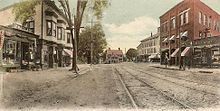Daniel Fuller Hutchinson is from a Baptist family, and in the post-war years, an active member of First Baptist Church Reading, Massachusetts.
Born at Greenfield, New Hampshire in 1839, he learned the trade of carriage making. Like many other tradesman, however, he puts aside his business and joins the Union Army, enlisting today at Boston. Assigned to Company B, 21st Massachusetts Voluntary Infantry, in the coming years he fights in many small battles and some large ones, including Second Bull Run (August 30, 1862), Antietam (September 16, 1862), Fredericksburg (December 11-15, 1862), Wilderness (May 5-7, 1864), and Petersburg (June 9 – July 20, 1864). At the latter he becomes ill and recovers at Fairfax Seminary Hospital near Washington. He musters out of the army November 14, 1864.
Following the war, Hutchinson returns to his trade of carriage making, or more specifically, the painting of carriages. While many war veterans north and south struggle to make ends meet following the war, Hutchinson makes a nice living as a businessman.
In 1874 he starts his own business, Liberty Square Carriage in Lynn, Massachusetts, “having five thousand feet of floor space, and employing eighteen men.” Yet his health takes a turn for the worse and in 1882 he sells his business and moves to the countryside to rest. Four years later, his health improved, he moves to Reading and opens another carriage business.
“His reputation for high-class work is not merely local, but extends throughout the state, and even farther. His skill as a first-class painter has brought him customers from all the surrounding towns. Of late years, on account of his health, he has been obliged to give up a great deal of active work. Mr. Hutchinson is a progressive citizen, much interested in the affairs of his home town. He has been a strong advocate of all modern improvements, electric railways and lights, water system, etc., as they have been proposed in the town. He has always worked heartily for all measures for the good of the town and community. In politics he is a Republican. He is a member of the First Baptist Church at Reading, and of the local Young Men’s Christian Association, and active in all religious work.”
The post-war years provide opportunity for many Baptist veterans in northern cities to parlay their skills, trade and/or knowledge into successful business ventures. In the process, many urban Baptist churches are transformed into congregations of businessmen and professionals, changing the dynamics of worship (often becoming more formal), discipline (experiences a decline after the war), and resources (leading to the building of larger, nicer facilities).
Source: William R. Cutter, ed. GENEALOGICAL AND PERSONAL MEMOIRS Relating to the Families of Boston and Eastern Massachusetts, Vol III (New York: Lewis Historical Publishing, 1908), p. 1442 (link); image (link)



